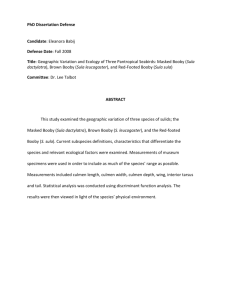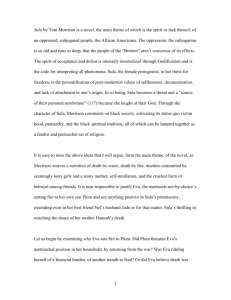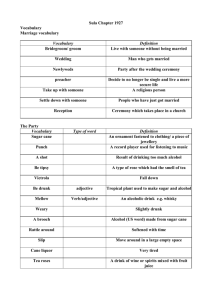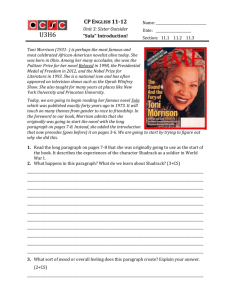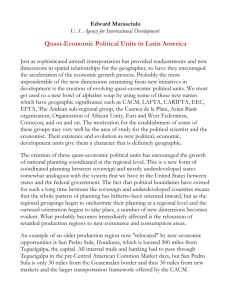A Study on the Conflicting Ideas of Black Women's Roles in Sula
advertisement
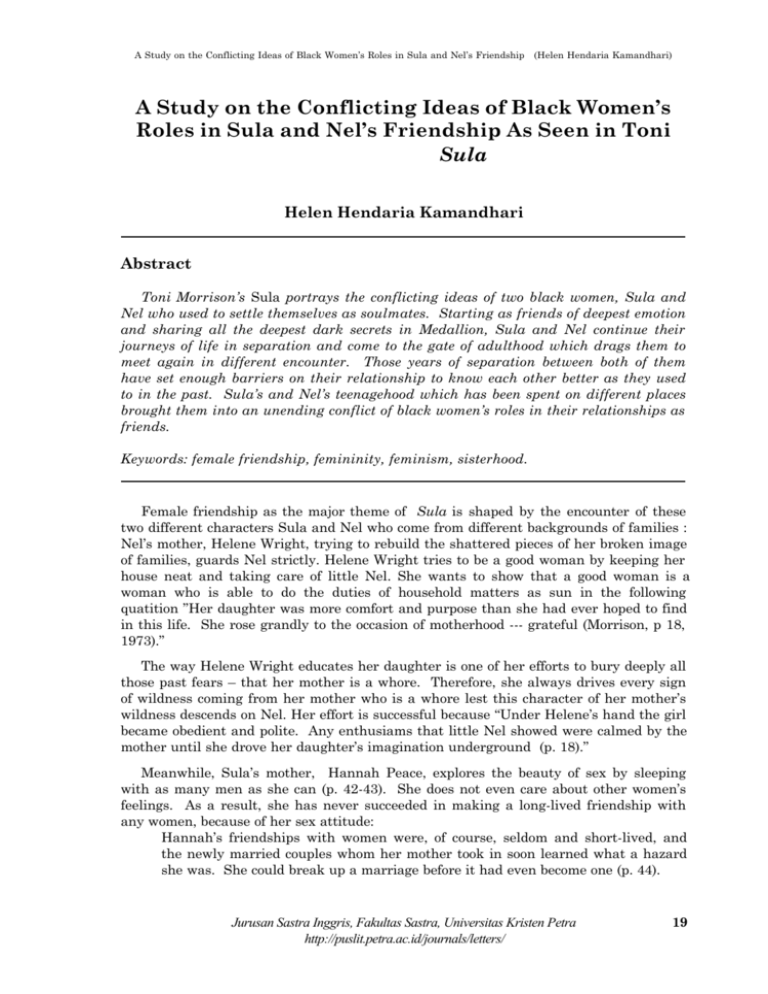
A Study on the Conflicting Ideas of Black Women’s Roles in Sula and Nel’s Friendship (Helen Hendaria Kamandhari) A Study on the Conflicting Ideas of Black Women’s Roles in Sula and Nel’s Friendship As Seen in Toni Sula Helen Hendaria Kamandhari Abstract Toni Morrison’s Sula portrays the conflicting ideas of two black women, Sula and Nel who used to settle themselves as soulmates. Starting as friends of deepest emotion and sharing all the deepest dark secrets in Medallion, Sula and Nel continue their journeys of life in separation and come to the gate of adulthood which drags them to meet again in different encounter. Those years of separation between both of them have set enough barriers on their relationship to know each other better as they used to in the past. Sula’s and Nel’s teenagehood which has been spent on different places brought them into an unending conflict of black women’s roles in their relationships as friends. Keywords: female friendship, femininity, feminism, sisterhood. Female friendship as the major theme of Sula is shaped by the encounter of these two different characters Sula and Nel who come from different backgrounds of families : Nel’s mother, Helene Wright, trying to rebuild the shattered pieces of her broken image of families, guards Nel strictly. Helene Wright tries to be a good woman by keeping her house neat and taking care of little Nel. She wants to show that a good woman is a woman who is able to do the duties of household matters as sun in the following quatition ”Her daughter was more comfort and purpose than she had ever hoped to find in this life. She rose grandly to the occasion of motherhood --- grateful (Morrison, p 18, 1973).” The way Helene Wright educates her daughter is one of her efforts to bury deeply all those past fears – that her mother is a whore. Therefore, she always drives every sign of wildness coming from her mother who is a whore lest this character of her mother’s wildness descends on Nel. Her effort is successful because “Under Helene’s hand the girl became obedient and polite. Any enthusiams that little Nel showed were calmed by the mother until she drove her daughter’s imagination underground (p. 18).” Meanwhile, Sula’s mother, Hannah Peace, explores the beauty of sex by sleeping with as many men as she can (p. 42-43). She does not even care about other women’s feelings. As a result, she has never succeeded in making a long-lived friendship with any women, because of her sex attitude: Hannah’s friendships with women were, of course, seldom and short-lived, and the newly married couples whom her mother took in soon learned what a hazard she was. She could break up a marriage before it had even become one (p. 44). Jurusan Sastra Inggris, Fakultas Sastra, Universitas Kristen Petra http://puslit.petra.ac.id/journals/letters/ 19 Volume 3, Number 1, June 2001: 19 – 24 Seeing this, the other women in the town -- the ‘good’ women disagree with what she has done towards the men: Hannah exasperated the women in the town – the “good” women, who said, “One thing I can’t stand is a nasty woman”; the whores, who were hard put to find trade among black men anyway and who resented Hannah’s generosity; the middling women, who had both husbands and affairs, because Hannah seemed too unlike them, having no passion attached to her relationships and being wholly incapable of jealousy. (Morrison, p. 44, 1973) Sula once saw her mother lying in the arms of a man who is definitely not her father which will change her perspectives on the possessiveness of men later when she is mature (p. 44). Because of men’s drifting in and out in her house, Sula is ill prepared for the possessiveness of one man: Marriage, apparently, had changed all that, but having no intimate knowledge of marriage, having lived in a house with women who thought all men available, and selected from among them with a care only for their tastes, she [Sula] was ill prepared for the possessiveness of the one person she felt close to. (p. 119) In one of the occasions of her childhood life, Hannah Peace has told her that sex is pleasant and permissive to experience yet it is not something that is extraordinary : Seeing her [Hannah’s] step so easily into the pantry and emerge looking precisely as she did when she entered, only happier, taught Sula that sex was pleasant and frequent but otherwise unremarkable. (p. 44) These two different backgrounds of families are capable of separating them by the time Sula and Nel become adults. These two different familial backgrounds have set up their minds specifically when they are separated from one another - the time when they are teenagers since they live in places different from one another. Sula lives in big cities outside Medallion, whereas Nel stays all her life in Medallion. At the time when Sula stays outside Medallion ( in the 1920’s to the 1940’s), there are many things happening among which are : feminism, modernism that permits sexual liberties, and the inventions to improve daily lives’ activities. All these values including her familial background bring a great impact on the shaping process of her personality. Upon returning to Medallion, Sula “wilfully defies Medallion’s values and its conventions : she slept with her best friend’s husband, she put her grandmother in a nursing home, she went to church supper without underwear, and worst of all, it was rumoured, she slept with white men” (Denard, p. 174, 1988). All of this “law breaking” in the eyes of Medallion people make them call Sula as a pariah which means that she is an outcast and therefore, she is not accepted by the society itself: She (Sula) was a pariah, then and knew it. Knew that they despised her and believed that they framed their hatred as disgust for the easy way she lay with men. Which was true. (Morrison, p. 122, 1973) Sula’s presence as a pariah cannot be accepted “because of her community’s rigid norms for women” (McDowell, p. 83, 1988). Her community’s norms dictate her that she has to get married as a woman and a woman has no other place but domesticity. Sula who has travelled a lot : to Nashville, Detroit, New Orleans, New York, Philadelphia, Macon and San Diego (Morisson, p. 120, 1973) has been shaped into another thing. Travelling causes her to be someone adventurous in her life – enjoying moving from one place to another to find that there is always something new in her 20 Jurusan Sastra Inggris, Fakultas Sastra, Universitas Kristen Petra http://puslit.petra.ac.id/journals/letters/ A Study on the Conflicting Ideas of Black Women’s Roles in Sula and Nel’s Friendship (Helen Hendaria Kamandhari) adventure. It happens also in her adventure of love after sleeping with many men, then, she discards them one by one: And the fury she created in the women of the town was incredible -- for she would lay their husband once and then no more . …Sula was trying them out and discarding them without any excuse the men could swallow. (Morrison, p. 115, 1973) The condition in which Sula discards the men with whom she has slept with shows that she is the “sexually desiring subject rather than as object of male desire” (McDowell, p. 82, 1988). Her continuous rejection of the myth that men are worth keeping is shown through her dispute with Nel when she is sick as a sign of disapproval between them: “I always understood how you could take a man. Now I understand why you can’t “Is that what I’m supposed to do? Spend my life keeping a man?” [Sula] “They ain’t worth more than me. And besides, I never loved no man because he was worth it. Worth didn’t have nothing to do with it.” “My mind did. That’s all.” (Morrison p. 143-144, 1973) Nel is not capable of accepting Sula’s idea that men are not worth keeping for because she loves Jude. She cannot stand Sula who, after taking away Jude from her side, dumps him. According to Sula, it seems that “after marriage she freezes into her wifely role, becoming one of the women who had “folded themselves into starched coffins” (McDowell, p. 82, 1988). Nel’s definition of self is based on the community’s absolute moral categories about good and bad women, categories that result in her separation from and opposition to Sula (p. 82). Sula thinks that Nel is “dead” after her submission into marriage with Jude, because in marriage she has lost her individual identity; her potential was crippled into the roles of wife and mother and her life becomes boring. According to Deborah E. McDowell, Nel’s sexuality is not expressed in itself and for her own pleasure, but rather for the pleasure of her husband and in obedience to a system of ethical judgment and moral virtue (p. 82). Because Nel’s sexuality is harnessed to and only enacted within the institutions that sanction sexuality for women – marriage and family – she does not own it. That is why it is impossible to imagine sex without Jude (p. 82). However, this is not so for Sula. Sula “went to bed with men as frequently as she could” (Morrison, p. 122, 1973) and assumed responsibility for her own pleasure (McDowell, p. 83, 1988). She denies the social definitions of “female sexuality and conventions of duty” (p. 83). Sula, in her sexual intercourse does not have any ego and she has no feeling of compulsion to be consistent with herself (Morrison, p. 119, 1973). She can walk out of any men’s lives as she wants because what she needs is only to prove her own sexuality and to fulfill her own satisfaction. Arguments between Sula and Nel is unavoidable since Nel herself has her own principles about how to live according to Medallion’s values – a place which she never leaves for all her life. As a black woman, she cannot strongly stand against the racism outside her society and sexism inside her society. She does this because she has experienced a terrible journey with her mother to the South when she is still a little girl. Jurusan Sastra Inggris, Fakultas Sastra, Universitas Kristen Petra http://puslit.petra.ac.id/journals/letters/ 21 Volume 3, Number 1, June 2001: 19 – 24 The conditions outside her society makes her mother tremble at the sight of the two black soldiers and the conductor: She [Nel] saw the muscles of their faces tighten, a movement under the skin from blood to marble. She felt both pleased and ashamed to sense that these men, unlike her father, who worshiped his graceful, beautiful wife, were bubbling with a hatred for her mother that had not been there in the beginning. It was on that train, shuffling towards Cincinnati, that she resolved to be on guard – always. She wanted to make certain that no man ever looked at her that way. That no midnight eyes or marbled flesh would ever accost her and turned her into jelly. (Morrison, p. 21-22, 1973) From that very young age, Nel makes a decision that she will never let other men look at her that way. She will not let that happen again. She thinks that it is too dangerous to stay away from Medallion - the place where she can find protection. For a woman and a black altogether, it is better to group with other women to overcome racism and sexism outside her society. That is why Nel has determined that she will never leave Medallion for all of her life after her first journey: “The many experiences of her crowded in on her. It was the last as well as the first time she was ever to leave Medallion” (p. 29). Nel believes that marital life is what she needs. She needs a man to guide her and to love her. Many women, including Nel, cannot live without a romantic relationship with a man and Nel wants to enjoy her romantic relationship in a marriage which is formally recognized by her patriarchal society – which means that they have to face the authority of male which oppresses women through the social, political, and economic institutions (Humm, p. 159, 1989). In this society, women are subordinate to men in order for people to make sex and ultimately reproduce society. Society places higher premiums on men, male activities, production in the factories and waged labour than on women, female activities, reproduction in the home, and domestic or wageless labour (Ruth, p. 244, 1990). This patriarchal view is what Sula resists against. In her opinion, Nel should have stayed with her and let her share Jude since both of them are friends which is the substantial part in Sula. Friendship among women, according to Toni Morrison, is probably the only currency of their lives (Essence, p. 275). Sula, after the ten-year separation from Nel and when she comes home to Medallion, hopes to find that Nel misses her. The first time, she arrives home, Nel did miss her. Yet, after her bedding down with Jude which is unforgiven according to Nel brings all women in Medallion including Nel to blame Sula for what she has done. Sula sees that Medallion society has formed its false sisterhood which is never based on truth and it is impossible for her to join them (Morrison, p. 121, 1973). Women in Medallion society seem to group with one another, though actually they compete with each other to seek approval from the other that they are the best. They announce compliments to each other and at that same time, it is also plain that both of them dislike each other. If the truth she reveals provokes other women, they should be able to forgive her instead of confronting her and even abandoning her – in order to sustain the existence of sisterhood. In sisterhood, they are sisters, and that is why they know each other’s weaknesses and strength and even their inner goodness. Sula does not expect Nel to belong to “the town and all of its ways” (p. 120). 22 Jurusan Sastra Inggris, Fakultas Sastra, Universitas Kristen Petra http://puslit.petra.ac.id/journals/letters/ A Study on the Conflicting Ideas of Black Women’s Roles in Sula and Nel’s Friendship (Helen Hendaria Kamandhari) Femininity makes women compete with each other to win men’s attention and forget their sisterhood since women in a patriarchal society have been trained to accept the male-defined norms. Even though women themselves are involved in female friendships -- sharing their secrets and fears --, still the sense of competition between them cannot be abolished because they have been trained to be feminine (Tracy, 81). That is why Sula shows the possible of the impossible that women actually do not need to choose marriage. Women can live alone and women can take care of themselves without men. To be involved in a marriage and have children drag women to the enslavement of a family – to fulfill the needs of their children and husbands with little or even no chance to think about themselves fully. Even if women can think about themselves for a moment, all that she has done to improve themselves are performed to please men’s eyes and satisfy their desires. Toni Morrison depicts and emphasizes much more importance on Sula’s goodness which connects more to an existential “inner” faith and integrity tan with sociometric “good works” or charity. Moreover, Morrison suggests that Sula’s antinomianism (a principle of rejecting a socially established morality) demands for itself the title of a personalist “virtue” that is validated by the misperception and incomprehension of Nel and the Bottom community (Grant, p. 101, 1988). Though hating Sula, Nel finally has to confess that she needs Sula more than she needs Jude as the concept of sisterhood reveals. She misses her togetherness with Sula which is impossible because Sula dies now. Nel’s sorrow upon the loss of Sula’s bond of sisterhood with her is employed by Toni Morrison to show that “women’s relationships with each other are more important and certainly more enduring than relationships with ‘men who restlessly drift in and out’” (Adams, p. 196, 1988). Strengthening women through sisterhood means a lot to black women as it is emphasized by Toni Morrison. This conforming to sisterhood for black women causes women to be free from the subordination which is found in male-female relationship. Sisterhood as comradeship should be regarded as more important than male-female relationship. To lose a ‘sister’ is much more miserable than to lose a man. Because of Sula’s death, Nel realizes that she missed Sula for all that time – as her true friend and References Adams, Anne. (1988). ‘Straining to Make Out the Words to the “Lied”: The German Reception of Toni Morrison’. In Nellie Y. McKay (ed.), Critical Essays on Toni Morrison. Boston, MA : G.K. Hall & Co. 90-102. Denard, Carolyn. (1988). ’The Convergence of Feminism and Ethnicity in the Fiction of Toni Morrison’. In Nellie Y. McKay (ed.), Critical Essays on Toni Morrison. Boston, MA : G.K. Hall&Co. 171-179. Grant, Robert. (1988). ‘Absence into Presence: The Thematics of Memory and “Missing” Subjects in Toni Morrison’s Sula’. In Nellie Y. McKay (ed.), Critical Essays on Toni Morrison. . Boston, MA : G.K. Hall&Co. 90-102. Humm, (1989). Maggie. The Dictionary of Feminist Theory. New York: Harvester Wheatsheaf. Jurusan Sastra Inggris, Fakultas Sastra, Universitas Kristen Petra http://puslit.petra.ac.id/journals/letters/ 23 Volume 3, Number 1, June 2001: 19 – 24 McDowell, Deborah E. (1988). “The Self and the Other” : Reading Toni Morrison’s Sula and the Black Female Text’. In Nellie Y. McKay (ed.), Critical Essays on Toni Morrison.. Boston, MA. : G.K. Hall&Co. 77-88. Morrison, Toni. Sula. New York : Alfred A. Knopf, Inc. 1973. Morrison, Toni. (1995). ‘The World according to Toni Morrison’. In Essence May, 222280. Ruth, Sheila. (1990). Issues in Feminism: An Introduction to Women’s Studies. California: Mayfield Publishing Company. Tracy, Laura. (1991). The Secret Between Us: Competition Among Women. Canada: Little, Brown and Company. 24 Jurusan Sastra Inggris, Fakultas Sastra, Universitas Kristen Petra http://puslit.petra.ac.id/journals/letters/

